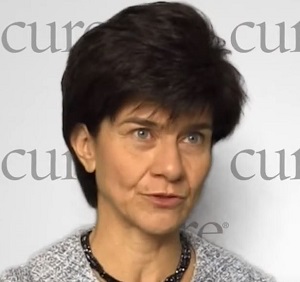Lung cancer genetic mutations and testing
Genetic mutations
Is lung cancer hereditary?
Genetic mutations inherited from parents are not thought to cause very many lung cancers by themselves. Still, genes do seem to play a role in some families with a history of lung cancer.
For example, people who inherit certain DNA changes in a particular chromosome (chromosome 6) are more likely to develop lung cancer, even if they don’t smoke or only smoke a little. Some people seem to inherit a reduced ability to break down or get rid of certain types of cancer-causing chemicals in the body, such as those found in tobacco smoke. This could put them at higher risk for lung cancer.
Other people inherit faulty DNA repair mechanisms that make it more likely they will end up with DNA changes. People with DNA repair enzymes that don’t work normally might be especially vulnerable to cancer-causing chemicals and radiation.
Source: Inherited gene changes (American Cancer Society, 2019)
Somatic (acquired) gene mutations
Gene mutations related to lung cancer are usually acquired during a person’s lifetime rather than inherited. These acquired (somatic) mutations in lung cells often result from exposure to factors in the environment, such as cancer-causing chemicals in tobacco smoke. But some gene changes may just be random events that sometimes happen inside a cell, without having an outside cause.
Acquired changes in certain genes, such as the RB1 tumor suppressor gene, are thought to be important in the development of small cell lung (SCLC) cancer, which can affect anyone but typically affects people who have a long history of smoking tobacco.
Acquired changes in genes such as the p16 tumor suppressor gene and the K-RAS oncogene, are thought to be important in the development of the most common type of lung cancer, non-small cell lung cancer (NSCLC). Changes in the TP53 tumor suppression gene and to chromosome 3 can be seen in both NSCLC and SCLC. Not all lung cancers share the same gene changes, so there are undoubtedly changes in other genes that have not yet been found.
Source: “Acquired gene changes” (American Cancer Society) (2019)
DNA mutations found in non-smokers with lung cancer
A genomic analysis of lung cancer in people with no history of smoking has found that a majority of these tumors arise from the accumulation of mutations caused by natural processes in the body.
 “What we’re seeing is that there are different subtypes of lung cancer in never smokers that have distinct molecular characteristics and evolutionary processes,” said epidemiologist Maria Teresa Landi, M.D., Ph.D., of the National Cancer Institute who led the study. “In the future we may be able to have different treatments based on these subtypes.”
“What we’re seeing is that there are different subtypes of lung cancer in never smokers that have distinct molecular characteristics and evolutionary processes,” said epidemiologist Maria Teresa Landi, M.D., Ph.D., of the National Cancer Institute who led the study. “In the future we may be able to have different treatments based on these subtypes.”
The study looked at 232 never smokers, predominantly of European descent, who had been diagnosed with non-small cell lung cancer. A future direction of this research will be to study people of different ethnic backgrounds and geographic locations, and whose exposure history to lung cancer risk factors is well described, Landi said.
Source: “NIH study illuminates origins of lung cancer in never smokers” on the National Cancer Institute website (September 6, 2021).
Non-smoking Asian American women twice as likely to develop lung cancer
Asian women in the United States who have never smoked are currently twice as likely to develop the disease than female non-smokers of other ethnicities.
 “More than 50% of Asian American females diagnosed with lung cancer did not smoke, although this proportion varies across ethnicities and is as high as 80% among Chinese females,” says Scarlett Lin Gomez, PhD., of the University of California San Francisco.
“More than 50% of Asian American females diagnosed with lung cancer did not smoke, although this proportion varies across ethnicities and is as high as 80% among Chinese females,” says Scarlett Lin Gomez, PhD., of the University of California San Francisco.
Since non-smokers (and light smokers) are not currently eligible for lung cancer screening, most cases of lung cancer among Asian American females would not be picked up by screening.
Gomez is a researcher on the FANS (Female Asian Never Smokers) Study, which aims to identify prevention methods and early diagnosis and treatment options for non-smoking Asian women with lung cancer.
Source: “Addressing High Lung Cancer Rates Among Female Asian Non-Smokers” by Karen Gehrman on the University of California San Francisco website (January 13, 2022)
Genetic testing
Many experts recommend that anyone diagnosed with NSCLC should have biomarker testing. If you did not receive it, talk to your doctor about biomarker testing now. This is particularly important for African Americans and other minorities who tend to have higher lung cancer rates, longer wait for care, and lower survival rates.
Biomarker testing shows specific mutations that drive NSCLC to grow and spread, which helps doctors learn about your unique type of lung cancer and how best to treat it.
Understanding Biomarker Testing in Non-Small Cell Lung Cancer
A 6-minute video from You and Lung Cancer
I would ask your doctor, "Are you going to look for genetic changes in my cancer?”
Twenty years ago, not much was known about the molecular basis of lung cancer, so there were no targeted agents with which to treat it. Today, biomarkers are a mainstay in determining the most beneficial approach to treating lung cancer.
 “We’ve come amazingly far,” says Joann Sweasy, director of the University of Arizona Cancer Center in Tucson. “It’s a game changer what we’re doing right now. We are so ahead of where we were in 2002, it’s amazing.”
“We’ve come amazingly far,” says Joann Sweasy, director of the University of Arizona Cancer Center in Tucson. “It’s a game changer what we’re doing right now. We are so ahead of where we were in 2002, it’s amazing.”
Although biomarker testing is becoming a bigger part of a patient’s care journey, not every patient has access to these tests. Social determinants of health and rural disparities make it more difficult for certain individuals to access these tests, and insurance does not cover them in all circumstances, Sweasy noted.
While biomarker testing is standard procedure at National Cancer Institute-designated centers (there are 73 centers across the U.S.), patients should inquire about the testing regardless of where they receive their diagnosis and treatment, Sweasy advises.
“I would ask, ‘How are you really going to diagnose my lung cancer? Are you going to profile the genomics and look for genetic changes in my cancer?’”
Source: “Biomarker Testing Provides ‘Real Potential’ to Manage Lung Cancer” by Darlene Dobkowski on the Cure Today website (November 14, 2022)
